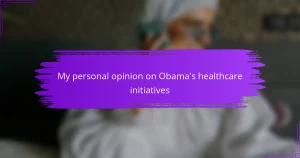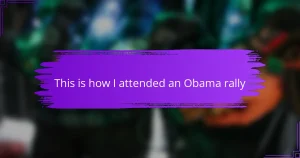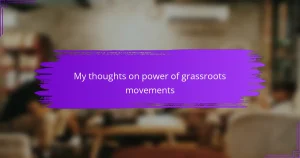Key takeaways
- Young people engage in politics driven by a desire to make a difference, bringing fresh ideas and urgency to issues like climate change and social justice.
- The Obama supporter community effectively encourages youth involvement by fostering dialogue and using digital platforms to connect with younger audiences.
- Challenges such as being dismissed due to age, navigating complex political systems, and balancing activism with personal life can hinder youth involvement in politics.
- Encouraging youth participation requires providing real leadership opportunities, clear political education, and a supportive environment that values their contributions.
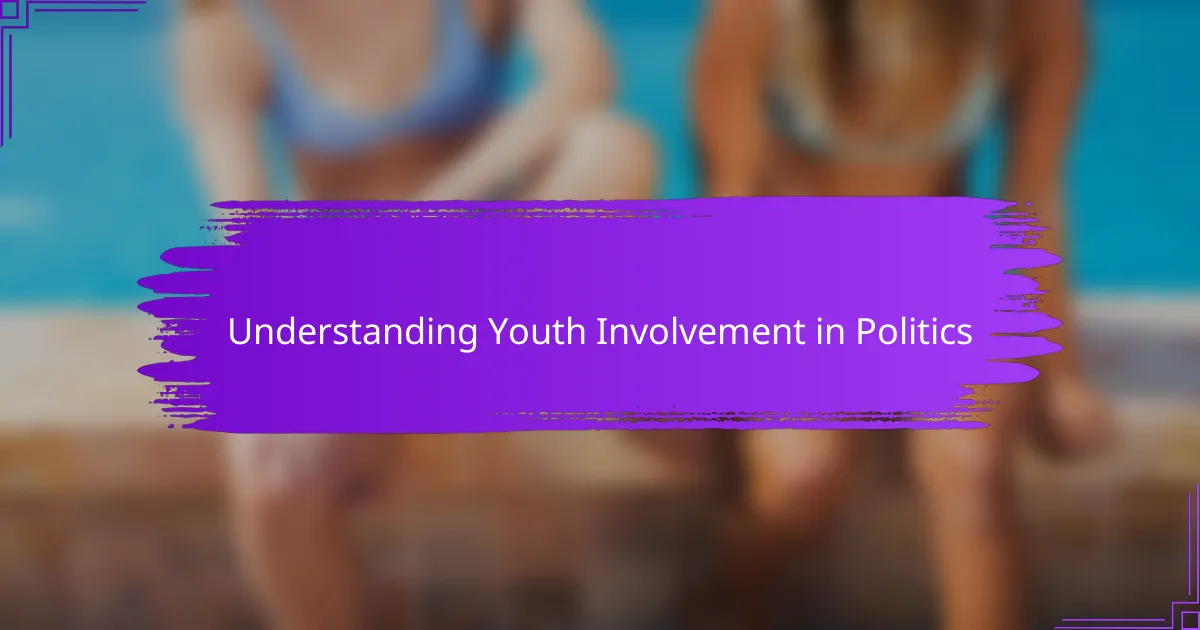
Understanding Youth Involvement in Politics
When I think about why young people get involved in politics, I often remember my own first experience at a local campaign event. It wasn’t just about the policies; it was about feeling heard and knowing that my voice could matter. Have you ever felt that spark, that sense of urgency to make a difference? That’s what drives many young people into the political arena.
Youth involvement isn’t just about casting votes; it’s about a deep desire to shape the future. From my perspective, young people bring fresh ideas and a passionate energy that can challenge the status quo. Their engagement often reflects a hope for progress and a frustration with the systems that seem slow to change.
Understanding this involvement means recognizing the emotional and intellectual commitment behind it. When I see young activists pushing for justice or climate action, I see more than just politics—I see a powerful force for transformation. What do you think motivates young people today? For me, it’s about hope, resilience, and the belief that change is possible.
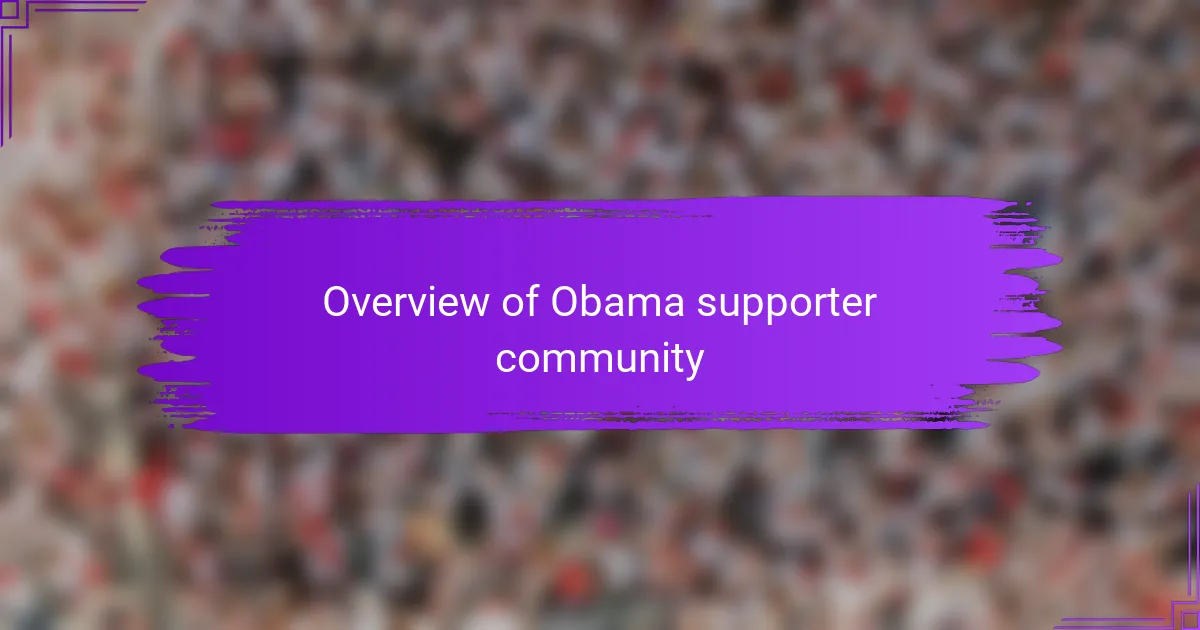
Overview of Obama Supporter Community
The Obama supporter community has always struck me as a vibrant and committed group. Supporting Obama wasn’t just about backing a candidate; it was about rallying around a vision for hope and change that resonated deeply with many. Have you noticed how this community blends diversity with a shared passion for progress?
What stands out to me is the way this group fosters connection and dialogue among people of all ages, especially encouraging younger voices to step forward. In my experience, it’s the energy within this community that keeps political conversations alive and meaningful beyond just election cycles.
I remember attending an Obama campaign event years ago where the enthusiasm was contagious—it wasn’t just the speeches, but the collective belief that together, real change was possible. Doesn’t that sense of belonging and purpose sound like exactly the kind of environment where youth involvement in politics can thrive?
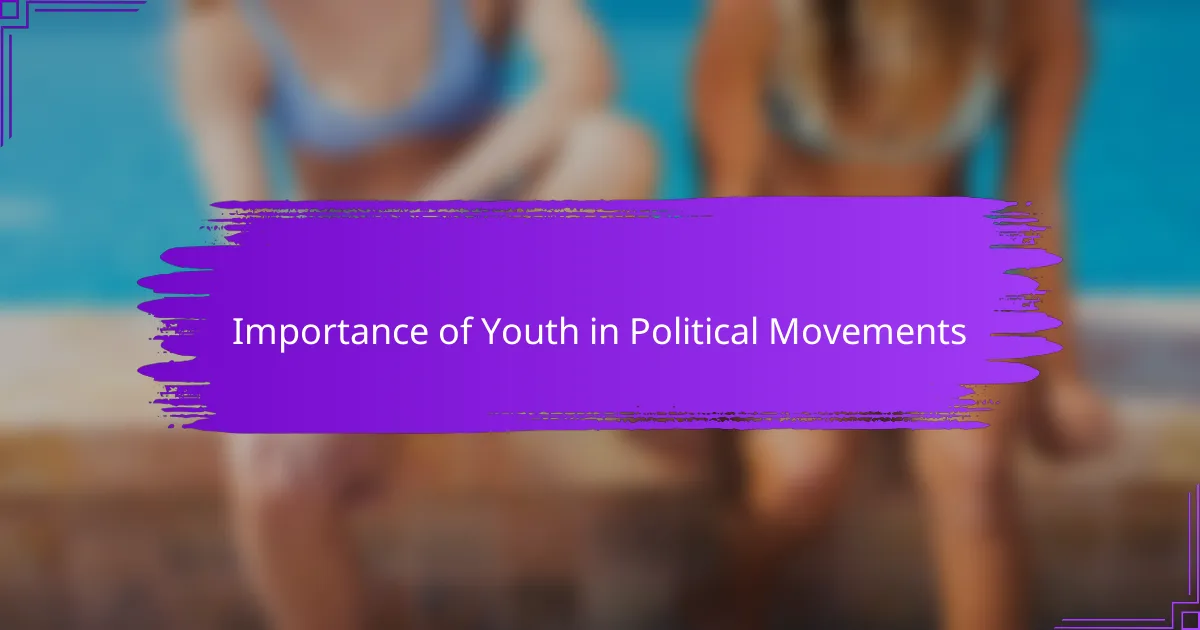
Importance of Youth in Political Movements
When I reflect on the importance of youth in political movements, I can’t help but recall moments when young activists turned the tide on issues that felt stagnant. Their fresh perspectives often breathe new life into old debates. Have you ever witnessed a young person’s passion ignite a room? That energy can be the catalyst for real change.
Youth bring a sense of urgency that I find inspiring. They aren’t just patient observers; they demand immediate action on issues like climate change and social justice. From my experience, this impatience isn’t reckless—it’s rooted in hope and a deep desire to build a better future.
What strikes me most is how youth involvement ensures political movements stay connected to evolving values. Without young voices, movements risk becoming out of touch or complacent. Isn’t it remarkable how a new generation can challenge and refine the path forward? This is why I truly believe youth are indispensable to any meaningful political momentum.
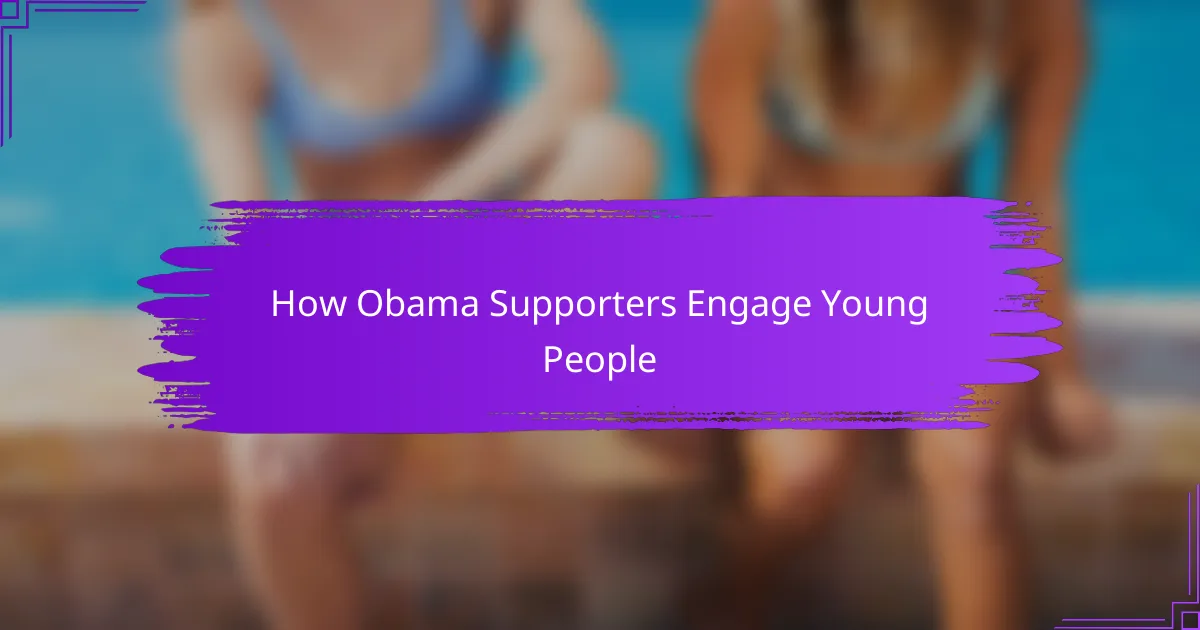
How Obama Supporters Engage Young People
One thing I’ve observed about Obama supporters is how they create spaces where young people feel valued and empowered. It’s not just about handing out flyers or asking for votes; it’s about listening to young voices and encouraging them to lead initiatives that reflect their passions. Have you ever been part of a group where your ideas suddenly mattered? That’s exactly the experience the Obama community strives to foster.
I’ve also noticed that Obama supporters often use social media in ways that resonate with younger audiences—sharing stories, hosting live discussions, and highlighting youth-led campaigns. This digital engagement makes politics feel immediate and personal, rather than distant or boring. When I see a young person lighting up in response to an online town hall or grassroots video, I feel hopeful that this approach is reaching hearts and minds where it counts.
But beyond technology, what really sticks with me is the way Obama supporters emphasize hope and collective action when engaging youth. They don’t just talk about problems; they invite young people to be part of solutions, inspiring a sense of responsibility without overwhelming them. Isn’t that the kind of encouragement that turns curiosity into commitment? From my perspective, this nurturing approach makes all the difference.
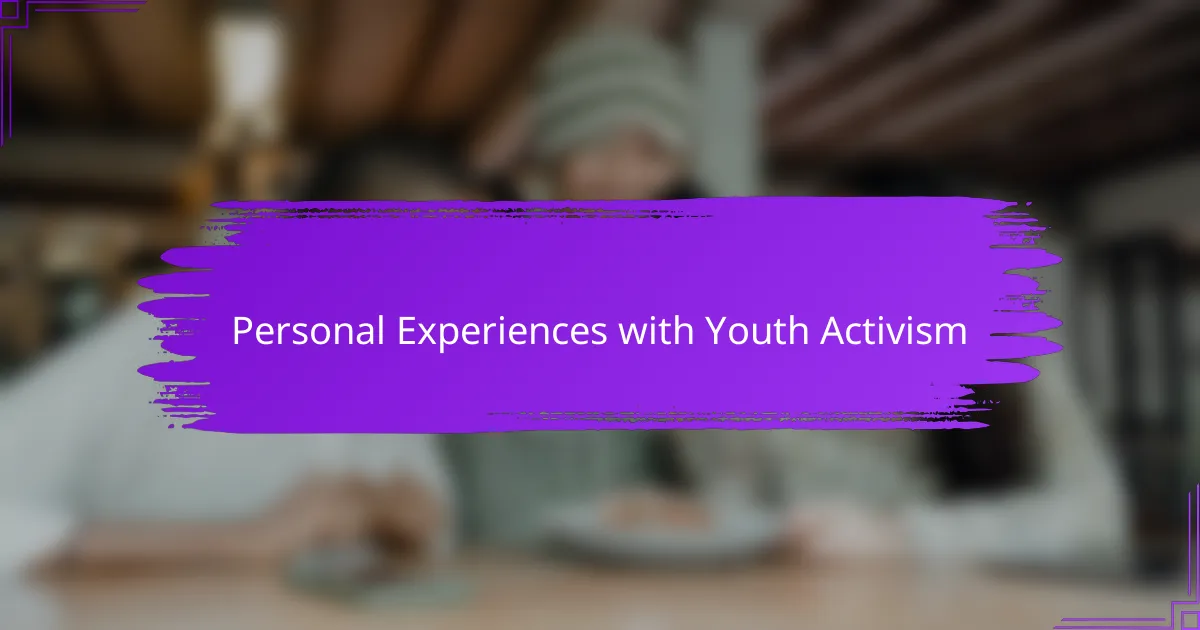
Personal Experiences with Youth Activism
I remember the first youth rally I helped organize; the energy was electric, and seeing peers speak up with such conviction gave me a renewed sense of optimism. Have you ever witnessed a group of young activists channel their frustration into strategy and action? That blend of emotion and purpose is something I find incredibly powerful.
Sometimes, I’m struck by how youth activism has taught me patience and persistence. Change isn’t always immediate, but watching young people refuse to back down—even when progress feels slow—reminds me that meaningful impact often comes from sustained effort. What’s your experience with staying committed despite setbacks?
On a more personal note, participating alongside young activists made me realize how their creativity reshapes political conversations. They bring a willingness to question traditions and explore innovative solutions that I hadn’t considered before. Doesn’t that kind of open-mindedness spark hope for the future?
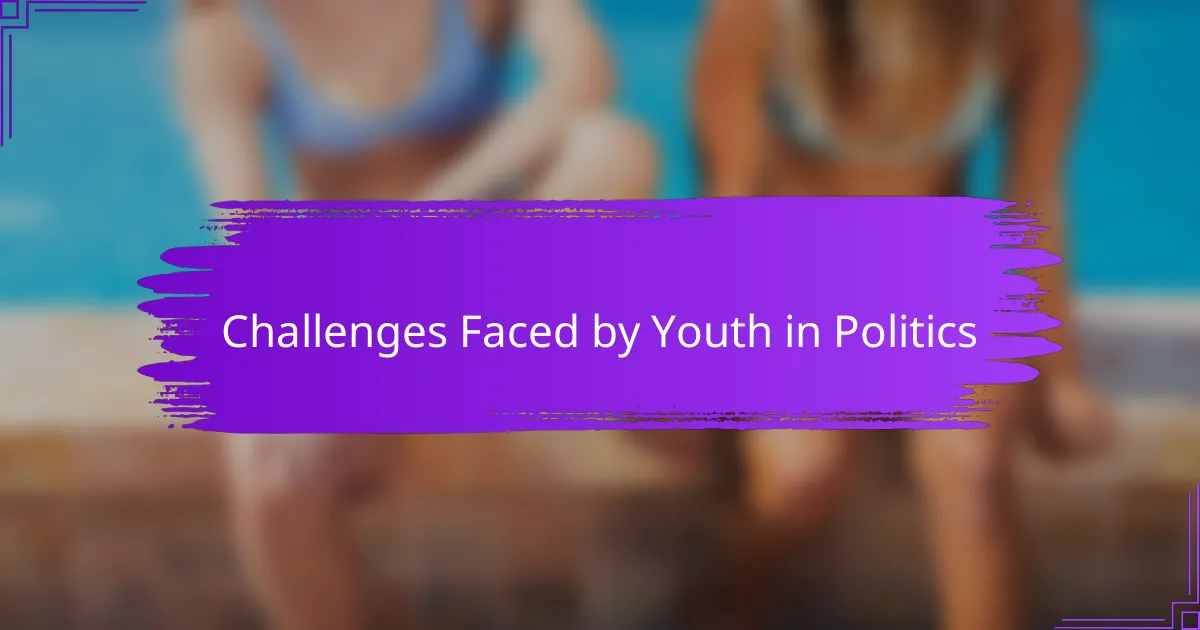
Challenges Faced by Youth in Politics
One challenge that immediately comes to mind is how often young people are dismissed as inexperienced or naive. I’ve seen talented young activists struggle to be taken seriously just because of their age. Have you ever felt overlooked in a room full of older voices? It can be frustrating to have ideas brushed aside when all you want is a chance to contribute.
Another hurdle is the sheer complexity of political systems. I remember feeling overwhelmed when I first tried to navigate local government—what felt like endless rules and jargon made it hard to know where to start. Does politics sometimes seem like a maze designed to keep newcomers out? That confusion can discourage even the most motivated youth from staying engaged.
Lastly, I think about the emotional toll youth often face. Balancing activism with school, work, or personal life isn’t easy, especially when the issues they care about are so urgent. I’ve met young people who’ve burned out because the weight of change felt too heavy too fast. How do we support them without adding pressure? From my experience, acknowledging these challenges openly can help create a more welcoming space for young leaders.
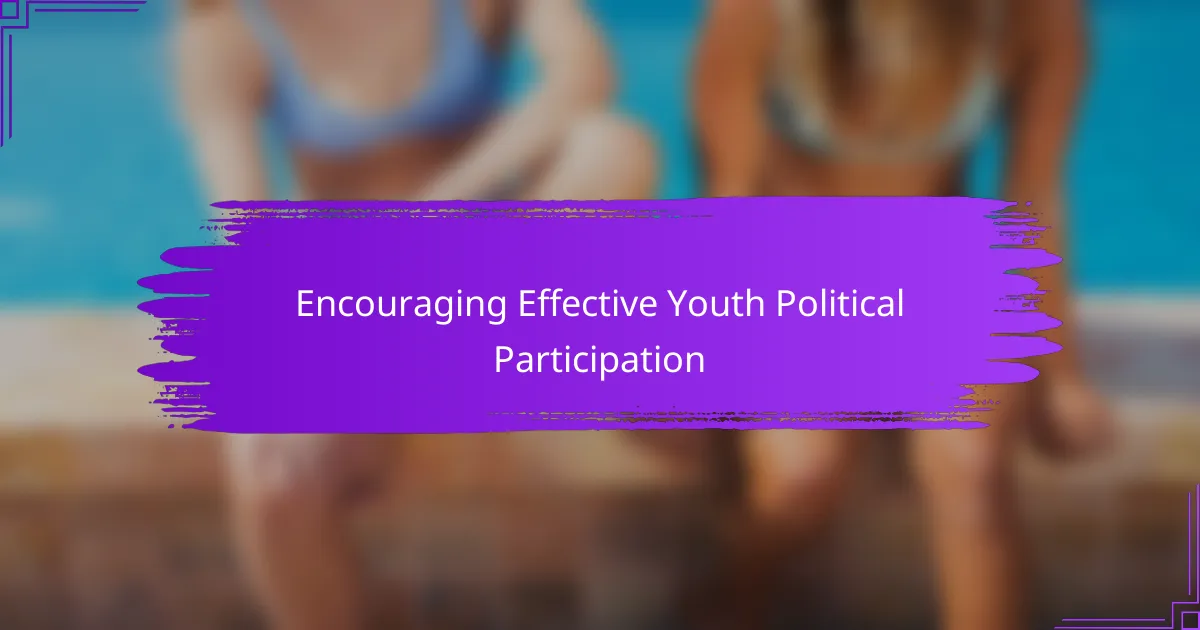
Encouraging Effective Youth Political Participation
Encouraging young people to participate effectively in politics starts with giving them real opportunities to lead. I recall a youth-led town hall I attended where the organizers weren’t just symbolic figures but decision-makers guiding the agenda. Doesn’t that kind of genuine involvement spark a sense of ownership and confidence?
It’s also crucial to provide accessible education about how political systems work. When I first dove into local politics, clear, straightforward explanations made all the difference in turning confusion into action. Have you noticed how understanding the process empowers young people to engage more boldly rather than feeling lost or sidelined?
Finally, nurturing a supportive community where mistakes are seen as learning moments—as I’ve experienced in grassroots groups—helps sustain youth enthusiasm. When young activists feel encouraged instead of judged, their passion grows stronger. What if we all embraced this compassionate approach to cultivate lasting political commitment?
